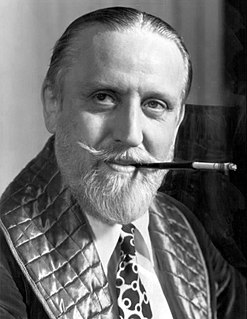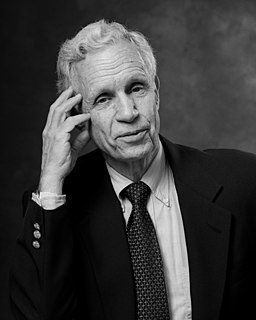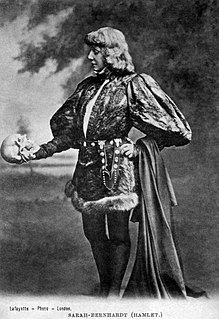Related Research Articles

Thornton Niven Wilder was an American playwright and novelist. He won three Pulitzer Prizes—for the novel The Bridge of San Luis Rey, and for the plays Our Town and The Skin of Our Teeth — and a U.S. National Book Award for the novel The Eighth Day.

The Theatre of the Absurd is a post–World War II designation for particular plays of absurdist fiction written by a number of primarily European playwrights in the late 1950s. It is also a term for the style of theatre the plays represent. The plays focus largely on ideas of existentialism and express what happens when human existence lacks meaning or purpose and communication breaks down. The structure of the plays is typically a round shape, with the finishing point the same as the starting point. Logical construction and argument give way to irrational and illogical speech and to the ultimate conclusion—silence.

Edgar Montilion "Monty" Woolley was an American actor. At the age of 50, he achieved a measure of stardom for his best-known role in the 1939 stage play The Man Who Came to Dinner and its 1942 film adaptation. His distinctive white beard was his trademark and he was affectionately known as "The Beard."

Kathakali is a major form of classical Indian dance. It is a "story play" genre of art, but one distinguished by the elaborately colorful make-up, costumes and face masks that the traditionally male actor-dancers wear. Kathakali is a Hindu performance art in the Malayalam-speaking southwestern region of Kerala.

Ancient Greek drama was a theatrical culture that flourished in ancient Greece from 600 BC. The city-state of Athens, which became a significant cultural, political, and religious place during this period, was its centre, where the theatre was institutionalised as part of a festival called the Dionysia, which honoured the god Dionysus. Tragedy, comedy, and the satyr play were the three dramatic genres to emerge there. Athens exported the festival to its numerous colonies.

David Martin Bevington was an American literary scholar. He was the Phyllis Fay Horton Distinguished Service Professor Emeritus in the Humanities and in English Language & Literature, Comparative Literature, and the College at the University of Chicago, where he taught since 1967, as well as chair of Theatre and Performance Studies. "One of the most learned and devoted of Shakespeareans," so called by Harold Bloom, he specialized in British drama of the Renaissance, and edited and introduced the complete works of William Shakespeare in both the 29-volume, Bantam Classics paperback editions and the single-volume Longman edition. After accomplishing this feat, Bevington was often cited as the only living scholar to have personally edited Shakespeare's complete corpus.
E. Patrick Johnson is the incoming dean of the Northwestern University School of Communication. He is the Carlos Montezuma Professor of Performance Studies and Professor of African-American Studies at Northwestern University. He currently serves as the Chair of the African-American Studies Department at Northwestern University and is a Visiting Scholar at the Annenberg School for Communication at the University of Pennsylvania. Johnson is the Founding Director of the Black Arts Initiative at Northwestern. His scholarly and artistic contributions focus on Performance Studies, African-American Studies and Women, Gender and Sexuality Studies.
The Gingerbread Lady is a play by Neil Simon. It was widely believed to have been written specifically for actress Maureen Stapleton, who won both the Tony Award and Drama Desk Award for her performance. But in a later autobiography, Simon wrote that he'd feared Stapleton might be "hurt" if she assumed the character's flaws and personal damage were a direct dramatization of her life. Simon said that it was director Mike Nichols' suggestion to cast Stapleton in the role, and that Simon responded, "This is not really Maureen. It's ten, twenty different actresses I've met over the years."
Frank Galati is an American director, writer and actor. He was a member of Steppenwolf Theatre Company and an associate director at Goodman Theatre. He taught at Northwestern University for many years.
Joseph Ignatius Breen was an American film censor with the Motion Picture Producers and Distributors of America who applied the Hays Code to film production.
"Speak the speech" is a famous speech from Shakespeare's Hamlet (1601). In it, Hamlet offers directions and advice to a group of actors whom he has enlisted to play for the court of Denmark.

Drama is the specific mode of fiction represented in performance: a play, opera, mime, ballet, etc., performed in a theatre, or on radio or television. Considered as a genre of poetry in general, the dramatic mode has been contrasted with the epic and the lyrical modes ever since Aristotle's Poetics —the earliest work of dramatic theory.

Theatre or theater is a collaborative form of performing art that uses live performers, usually actors or actresses, to present the experience of a real or imagined event before a live audience in a specific place, often a stage. The performers may communicate this experience to the audience through combinations of gesture, speech, song, music, and dance. Elements of art, such as painted scenery and stagecraft such as lighting are used to enhance the physicality, presence and immediacy of the experience. The specific place of the performance is also named by the word "theatre" as derived from the Ancient Greek θέατρον, itself from θεάομαι.

Rochelle Bass Owens is an American poet and playwright.
A Teaspoon Every Four Hours is a comedy play written by Jackie Mason and Mike Mortman which was produced on Broadway in 1969. The play set a Broadway record by having 97 previews before its official opening. After its official opening, A Teaspoon Every Four Hours closed after only one performance.
Ruby Cohn was an American theater scholar and a leading authority on playwright Samuel Beckett. She was a professor of Comparative Drama at the University of California, Davis for thirty years.
Whiskey is a one-act play by Terrence McNally.
William Marshall Grange is Professor of Theatre at the University of Nebraska–Lincoln's Johnny Carson School of Theatre and Film. His research publications are mostly concerned with the history of German-language theater and German-language literature. He has published several books, most recently The Business of American Theatre. He is also the author of numerous book chapters, articles in scholarly journals, reviews of both books and productions, and has presented dozens of papers at scholarly conferences both in the United States and abroad.

Gerald Martin Bordman was an American theatre historian, best known for authoring the reference volume The American Musical Theatre, first published in 1978. In reviewing an updated version of American Musical Theatre in 2011, Playbill wrote that the book had "altered the scope of American musical theatre history" and "remained the only book of its kind, and an invaluable one."

The Doughgirls is a three-act play written by Joseph Fields. Producer Max Gordon staged it on Broadway, where it debuted at the Lyceum Theatre on December 30, 1942. The play is a comedy about three unmarried women sharing a room in an overcrowded hotel in Washington, D.C. during World War II. The Broadway production was a hit that ran for 671 performances and closed on July 29, 1944. It was adapted as a film of the same name in 1944.
References
- ↑ Cecily O'Neill (27 August 2014). Dorothy Heathcote on Education and Drama: Essential Writings. Routledge. pp. 63–. ISBN 978-1-317-63250-4.
- ↑ James Fisher (1 June 2011). Historical Dictionary of Contemporary American Theater: 1930-2010. Scarecrow Press. pp. 286–. ISBN 978-0-8108-7950-8.
- ↑ Thomas S. Hischak Professor of Theater State University of New York at Cortland (12 January 2001). American Theatre : A Chronicle of Comedy and Drama, 1969-2000: A Chronicle of Comedy and Drama, 1969-2000. Oxford University Press, USA. pp. 192–. ISBN 978-0-19-535255-9.